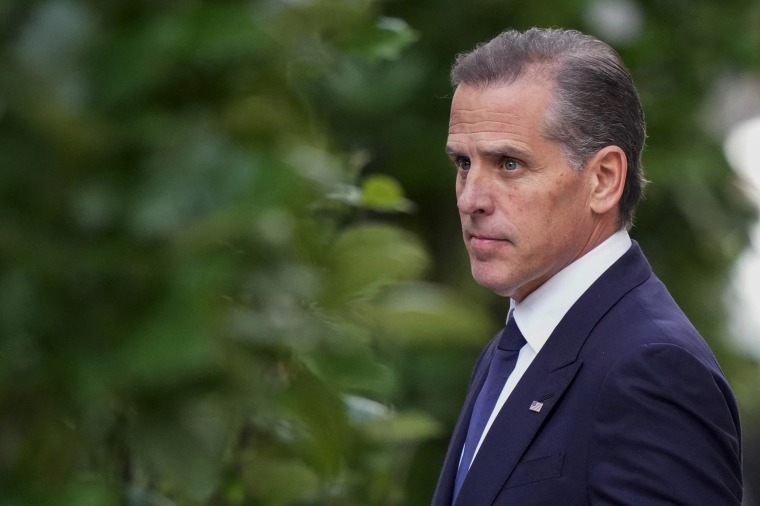‘An every day part of the world’

WILMINGTON, Del. — A sister who faced drug and credit card fraud charges. A childhood best friend who overdosed on heroin. A nephew who was a scholarship athlete who became addicted to oxycontin after an injury.
As lawyers for the government and those defending the president’s son sought Monday to narrow a field of more than 250 Delawareans to a jury of 12 and four alternates, they heard again and again about the toll that addiction had taken on many who would potentially hear a case that will delve into the darkest chapter of Hunter Biden’s own battle with drug use.
Of 65 potential jurors who filed in and out of the federal courtroom to be questioned by Judge Maryellen Noreika, at least 26 indicated that either they, a family member or a close friend had suffered from drug or alcohol abuse, or had been addicted to drugs or alcohol, according to a review of the transcript. Of that group, four were chosen for the final jury, with a fifth serving as an alternate.
On Tuesday, prosecutors will begin to lay out evidence of their case against Hunter Biden, aiming to prove that he knowingly and illegally purchased a firearm while using illegal drugs, and did not truthfully fill out paperwork, which requires an individual to testify to their sobriety. Legally, his defense team will aim to create doubt among jurors about that evidence and highlight his efforts to repair his life.

Politically, President Joe Biden’s campaign is counting on a majority of Americans to see in Hunter Biden a familiar, if difficult, reminder of struggles in their own lives.
A source close to the president and first lady Jill Biden said they appreciated that so many members of the jury pool referenced addiction or substance abuse in their own families. They have long felt, the source added, that people understand the complexity of the dynamic on display with their son.
Another source close to the family noted that Hunter Biden had previously encouraged his father to be open about his addiction during the 2020 campaign. This was reflected in comments Biden made during his first debate against Donald Trump when the Republican nominee attacked Hunter Biden. That same theme in 2020 is still just as relevant in 2024, the source added.
“Hunter’s resilience in the face of adversity and the strength he has brought to his recovery are inspiring to us. A lot of families have loved ones who have overcome addiction and know what we mean,” Biden said in a written statement issued yesterday as the trial began.
Jill Biden, who attended the entire jury selection process, heard one potential juror say he had worked at the same community college in Delaware that the first lady had taught at while explaining that his spouse had problems with addiction.
One woman selected as an alternate juror said that “unfortunately, being from the area,” she knew many people dealing with addiction. “I feel it’s an everyday part of the world these days,” she said.
Most, but not all, of the jurors who were questioned said their experience with their family members or friends would not prevent them from being fair and impartial in hearing the case.
“I think it would be easier for me because I went through that with my parents,” said one potential juror, who was later struck from the pool. “It is a disease, you know, and I don’t look down upon that or feel any judgment because people have problems.”
“I think after everybody is recovering, they need a second chance. My daughter has been given a second chance, everybody needs a second chance,” another potential juror, who also was later struck, told the court.
But at times, lawyers for the government and Hunter Biden took the opportunity to ask for more specific details to understand how it might influence their thinking.
Derek Hines, the lead prosecutor in the case, asked a woman who worked as a drug counselor if she would hold someone responsible who was an addict. The woman had also indicated she had family and friends dealing with addiction, including two who sought rehabilitation.
“Yes,” she said.
Abbe Lowell, Hunter Biden’s attorney, quickly posed the opposite scenario: “If the evidence goes to the standard the judge will tell you, you could find somebody not guilty?”
“Yes,” she answered again. She was later dismissed from the pool.
Another exchange involved a man who said his older brother had been addicted to PCP and heroin. Under questioning, he said his brother also had owned a gun.
“Do you have any views as to whether someone like your brother, someone who is addicted to drugs, should be able to have a firearm?” Hines asked.
“No, they shouldn’t,” the man responded.
“What about somebody who has had that abuse and then no longer did?” Lowell asked.
“Well, I believe that there is room for change,” the man answered.
He was ultimately one of the 12 selected to hear the case.







